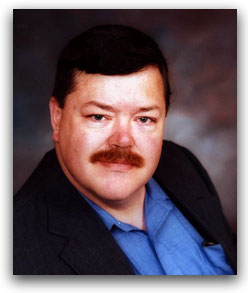
PROBE
George Manley
Interview by Chuck Shandry
As a member of the Tiffany Grant fan club on Yahoo, I’ve followed the course of George Manley’s voice acting career, primarily for English dubs of Japanese animation, a.k.a. anime, via his posts informing us fellow members of his induction into the art of voice acting. Mr. Manley kindly assented to this interview via e-mail.
Thanks for the interview. How are things in the dubbing buisness nowadays? Is there a character listing — “faceless minion?" No one starts with leading roles, I guess.
You'll usually find those under the monicker of "additional voices" at the end of every episode. As an example, in Aura Battler Dunbine, I play a character called Kotano, whose line count hasn't been large enough to credit individually, so I pop up under "additional voices." On top of that, I've also done numerous voices for Carl Macek on the project in the more traditional backdrop of the group walla session.
However, many bit characters and minor characters are consolidated as "additional voices" in credits, because the actors who do them are often called upon to do much more than one in a session. Of course, I don't mean to single out Dunbine either. I've been many of those aforementioned minions in Noir, Rahxephon and Nuku Nuku Dash, to name a few.
What has been the most unusual role you’ve voiced?
Man, that's a fair question. I would dare say it was Mary the Shepherd from Those Who Hunt Elves II. I mean, here's this guy who's like 70 years old, who's dressed from his neck to his toenails in black spandex like he's a bargain basement Batman or something. And he brags about how he's going to get the job done (stripping a "blessed dress" off of an elf) because he knows how to shear sheep. Everything about his look and braggadocio said "Hannibal Lechter," and so, during his non-action scenes, I tried to cram an Anthony Hopkins delivery together with my bass pipes and I think that came out as really unusual.
Describe what happens during a recording session.
The engineer sets your mic. Word of warning to folks who want to make
your living in this business, but stop me if you've heard this before.
Do not, under any circumstances, adjust the mic yourself. Let the
engineer do that. That way, if it breaks, you were standing there innocently
waiting for assistance, as it should be.
Are multiple roles recorded at the same time?
Yes, you can play more than one role at once. Generally speaking, though, the larger the characters you play, you will normally only run through one character's lines at a time to maintain the veracity of the character you're playing.
This is especially true of an actor like me who's made more than one character come to life in less than one four-hour session. An example would be during my recording of the Dirty Pair movies, where we did all three in three hours and I recorded three different characters and their foley/walla at the same time, but the key was to only do one of those characters at a time.
If you have a smattering of smaller characters to do, then you might be well served to just hit the lines as they come up, even if you're switching back and forth between characters. Even so, many directors will insist that you only record one character at a time so you can maintain the vocal placement that goes into making that character.
How difficult is it to follow a script, and are ad libs allowed?
Following a script is a relative issue. There are points at which sometimes the script as written does not always match the mechanics (lip flaps, smacks and what not on the screen) that we need to hit. In other cases, the script was written with a specific pronunciation in mind, and you have to say a word in a way that you normally don't to fit what the gaping hole of a lip-flap is doing. It still fits, but awkwardly, at times. The strange thing is, that once you see it played back, you scratch your head and go, "Wow, it fits." So, that's one part of ADR acting that is sometimes very mechanic-like instead of artistic. Some producers/directors insist on stricter adherence to what's written, some realize that changes need to be made, and we make them on the fly, if necessary.
Is ad-libbing allowed? Yes and no. If you're doing a walla session and you know that you're going to be combined with eight other voices and then subdued to be the background noise, then it's actually encouraged. Listen to one of the later volumes of NOIR, and see if you can pick out Charles Kennedy's "monkey in a bucket" routine.
If you are doing a series with some very sensitive subject matter or
one in which the translation, by necessity, is going to be scrutinized,
then your "wiggle-room" is going to be very minimal. However,
you still have to make your dub product sound like your characters are
speaking in conversational English. It's quite a challenge to the writers
and producers, of course.